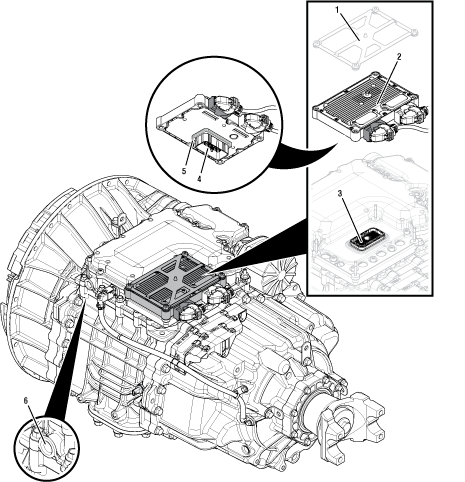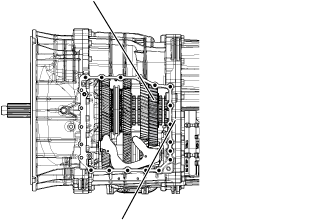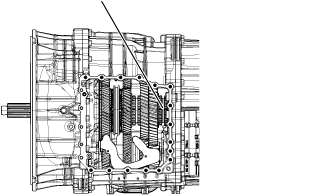Fault Code 788: Rail D Calibration
J1939: SA 3 SPN 5954 FMI 7, 20, 21, 31
Overview
The Endurant HD transmission is equipped with solenoids to direct pneumatic flow to actuate shift rails and sensors to monitor rail positions. The Transmission Control Module (TCM) compares the rail command and position to ensure proper rail operation. A Rail Calibration is performed to actuate each shift rail through all their positions. The shift rail positions are stored in memory and used to precisely actuate a shift rail during normal operation. The solenoids, positions sensors and shift rails are located in the MTM and connected to the TCM at the 74-Way Transmission Harness Connector.
Detection
The TCM monitors the Rail D position during a Rail Calibration. If a system failure is detected, the fault is set active.
Conditions to Set Fault Code Active
FMI 7 – Mechanical System Not Responding: Rail D Position Sensor indicated no movement in the Aft direction during a rail calibration.
FMI 20 – Data Drifted High: Rail D Position Sensor indicated insufficient movement in the Aft direction during a rail calibration.
FMI 21 – Data Drifted Low: Rail D Position Sensor indicated insufficient movement in the Fore direction during a rail calibration.
FMI 31 – Condition Exists: Rail D Position Sensor indicated no movement in the Fore direction during a rail calibration.
Fallback
FMI 7, 20, 21, 31:
- If Rail D position is known and fully engaged
- Amber warning lamp on
- Shift Rail D movement prohibited
- If Rail D position is not known or not fully engaged:
- Amber warning lamp on
- Shift Rail C movement prohibited
- Shift Rail D movement prohibited
- Non neutral modes prohibited
- PTO Mode prohibited
- If vehicle is moving - Red stop lamp on
Conditions to Set Fault Code Inactive
FMI 7, 20, 21, 31: Key cycle and condition no longer exists.
Possible Causes
FMI 7, 20, 21, 31:
- MTM - Rail D
- Rail D Solenoids
- Rail D Cylinder
- Rail D Detent
- Rail D Yoke
- Rail D Position Sensor
- Internal Transmission
- Rail D Sliding Clutch
- Main Shaft Assembly
- Primary Driven Gear
- Reverse Gear
Additional Tools
- Endurant HD Service Manual TRSM0950
Component Identification
 |
1. Transmission Control Module (TCM) Cover 2. Transmission Control Module (TCM) 3. 74-Way Transmission Harness Connector (MTM-side) 4. 74-Way Transmission Harness Connector (TCM-side) 5. Transmission Control Module (TCM) Seal 6. MTM Air Inlet Port |
Fault Code 788 Troubleshooting
Set the vehicle parking brake and chock wheels.
Record the transmission fault codes, FMIs, occurrences, and timestamps from the Service Activity Report created during the Diagnostic Procedure.
If Fault Code 788 is Active or Inactive, Go to Step B
Key off.
Refer to OEM guidelines and vent the vehicle air supply line to the MTM.
Refer to OEM guidelines and remove the vehicle air supply line at the MTM.
Inspect the vehicle air supply line and the MTM air inlet port for contamination, moisture, corrosion and/or debris.
Note: Verify the MTM inlet screen is installed and free of contamination and/or debris.

If contamination is found, refer to OEM guidelines for repair or replacement of the vehicle air system. Replace the Mechatronic Transmission Module (MTM) and reference the Lower Countershaft Cover and Inertia Brake Service Procedure for replacement of the Inertia Brake Assembly. Go to Step V
Note: MTM removal and installation requires the transmission to be removed from the vehicle. Reference Endurant HD Service Manual TRSM0950, Transmission Removal Service Procedure.
If no contamination is found, Go to Step C
Key off.
Remove the MTM.
Note: MTM removal and installation requires the transmission to be removed from the vehicle. Reference Endurant HD Service Manual TRSM0950, Transmission Removal Service Procedure.
Inspect the Primary Driven Gear for excessive fore and aft movement.

Inspect the Reverse Gear for excessive fore and aft movement.
If excessive gear movement is evident, inspect for cause of excessive gear movement and repair. Go to Step V
If no excessive gear movement is evident, Go to Step D
Inspect the Rail D Sliding Clutch yoke slot for wear.

Shift the Rail D Sliding Clutch to the neutral position (if necessary).
Shift the Rail D Sliding Clutch into the Primary Driven Gear engagement position (fore).
Inspect the Rail D Sliding Clutch clutching teeth for wear.
Return the Rail D Sliding Clutch to neutral.
Shift the Rail D Sliding Clutch into the Reverse Gear engagement position (aft).
Inspect the Rail D Sliding Clutch clutching teeth for wear.
Return the Rail D Sliding Clutch to neutral.
If the Rail D Sliding Clutch shifts into all three positions and no clutching teeth wear is present, replace the Mechatronic Transmission Module (MTM). Go to Step V
If the Rail D Sliding Clutch does not shift into all three positions or clutching teeth wear is present, reference TRSM0950 Main Shaft Disassembly/Assembly Procedure for replacement of the following components and Go to Step V
- Primary Driven Gear
- Rail D Sliding Clutch
- Reverse Gear
Key off.
Reconnect all connectors and verify that all components are properly installed.
Key on with engine off.
Connect ServiceRanger.
Go to “Fault Codes”.
Select “Clear All Faults”.
Operate vehicle and attempt to reset the fault code or duplicate the previous complaint.
Check for fault codes using ServiceRanger.
If no fault codes set and the vehicle operates properly, test complete.
If Fault Code 788 sets Active during operation, Go to Step A
If a fault code other than 788 sets Active, troubleshoot per the Fault Code Isolation Procedure Index.